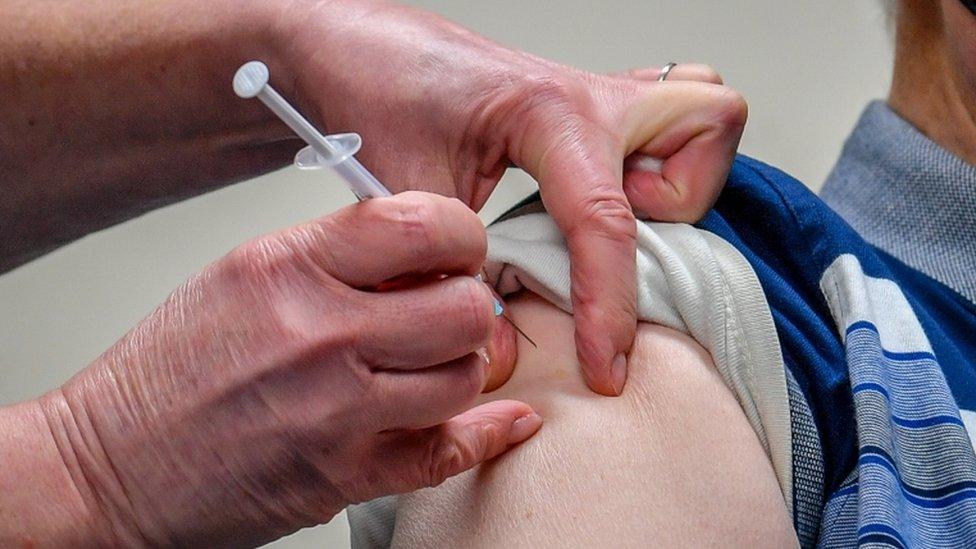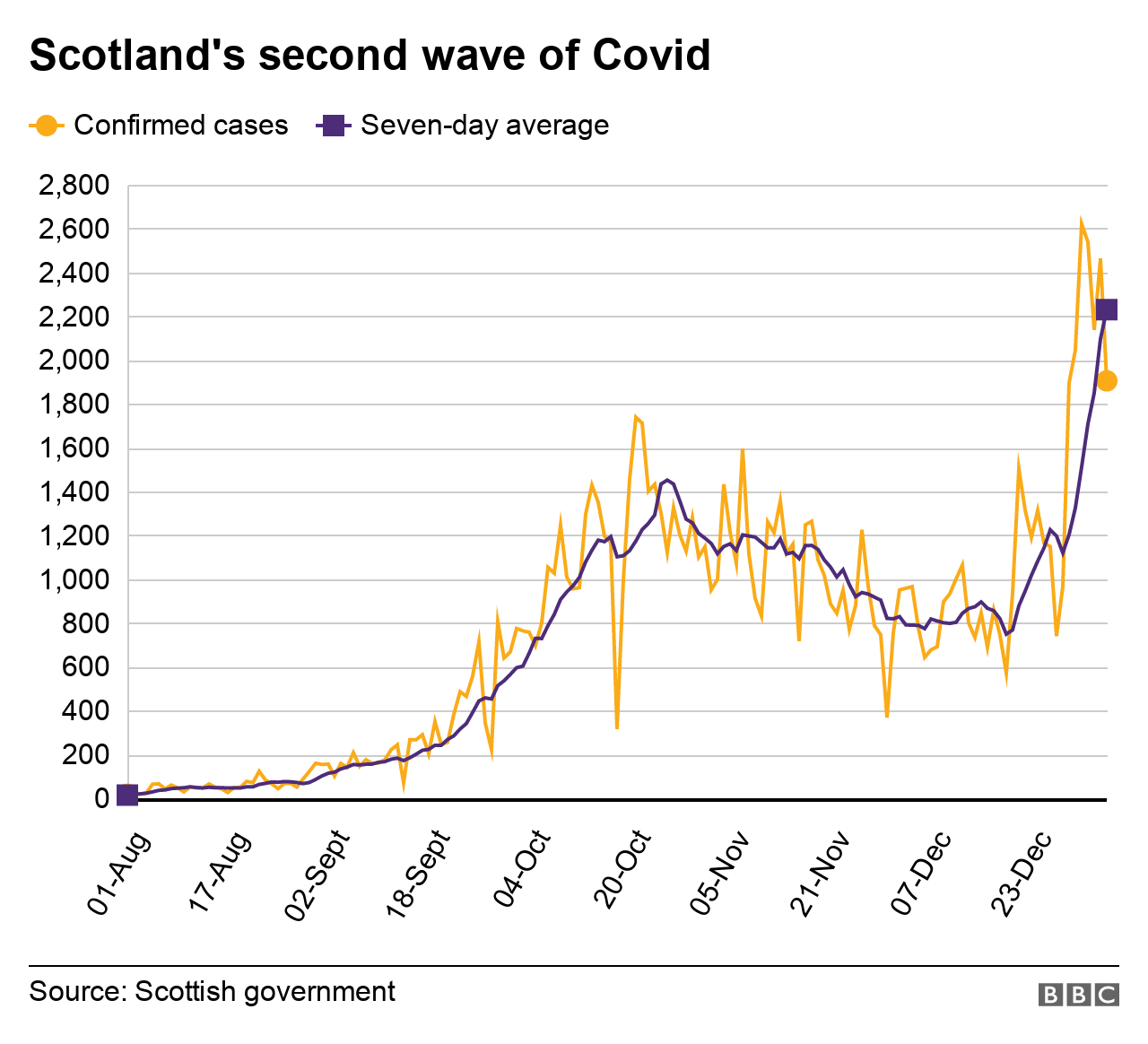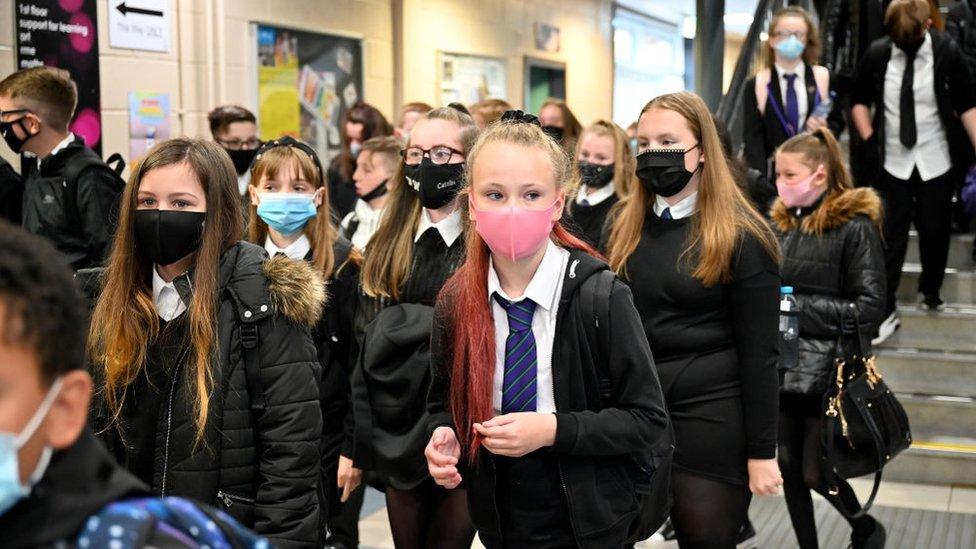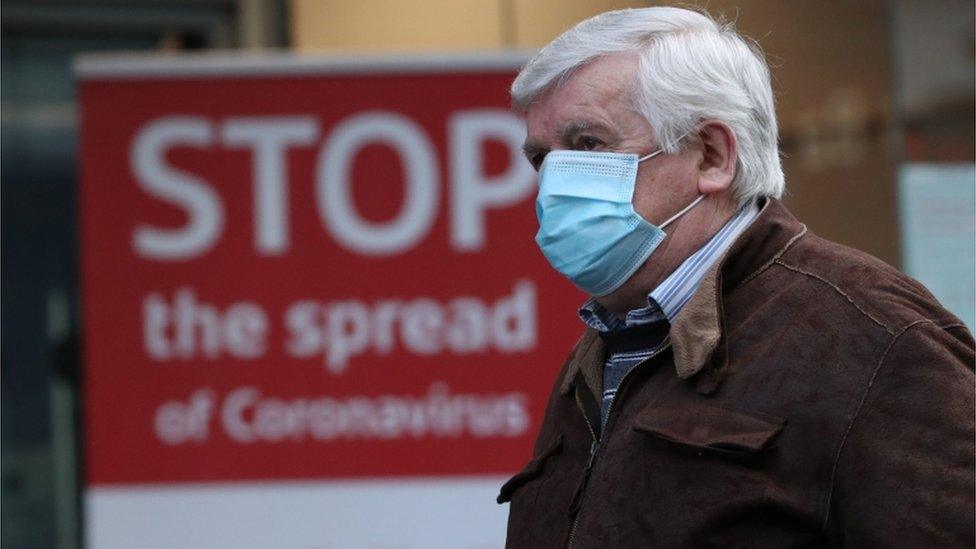Covid: Nicola Sturgeon says Scotland hopes to accelerate vaccine rollout
- Published

The new Oxford vaccine was given to the first people on Monday
Scotland hopes to accelerate its vaccine rollout programme if supplies of the jab allow it to do so, the country's first minister has said.
The Scottish NHS hopes to vaccinate everyone over the age of 50 and younger people with underlying health conditions by the start of May.
If the target is achieved, it would mean 2.7 million people - about half of the population - will have had the jab.
It would then be rolled out to the rest of the adult population.
But Nicola Sturgeon said that timetable was a "cautious prediction", and the aim was to accelerate the rollout "as fast as we possibly can" as more details about supply became available.
Ms Sturgeon was speaking as new lockdowns began in both Scotland and England, with people being told to stay at home except for a handful of permitted reasons.
The tough restrictions will remain in force across all of mainland Scotland, Skye, Arran, Bute and Gigha until at least the end of the month, and will see schools closed to most pupils, places of worship shut and group exercise banned.
Speaking to the BBC Radio's Good Morning Scotland programme, the first minister said it was difficult to be definitive about when the restrictions would be lifted.
But she said it might be possible to ease some of the rules if the vaccination programme managed to push ahead of the virus in the "race" over the coming months.
Ms Sturgeon said: "Lockdown is about trying to slow down the virus and push rates of it back down.
"Now, if we manage to do that, then hopefully we will be able to start lifting some of these restrictions while the vaccination programme is ongoing, even in that first phase of it.
"But I can't be certain about that yet, because it's dependent on us managing to get the levels of infection down."

Cases of Covid have risen sharply in recent days
Scotland hopes to have received just over 900,000 doses of the vaccine by the end of January - including the 100,000 doses that have already been administered to people.
Ms Sturgeon said the government did not yet have full certainty about supply schedules after this month, but said details were being firmed up all the time.
And she said a "cautious prediction" would be that "we will have vaccinated the whole of the JCVI priority list by early May, which is everybody in Scotland above the age of 50 and people under 50 with underlying health conditions.
"That is about 2.7 million people, and we will then go on to the rest of the population.
"But we will be working as information on supplies becomes clearer to accelerate that timetable as fast as we possibly can."
The NHS in England has said it hopes to be able to deliver two million vaccines a week by the end of this month.
And Prime Minister Boris Johnson has said he wants to vaccinate people in the top four priority groups in England by mid-February - which would include everyone over the age of 70 and the most clinically vulnerable, as well as care home staff and residents and frontline health and social care workers.
'Undermine confidence'
Ms Sturgeon later told her daily briefing that said she would ideally want to do the same, but that she did not yet have enough certainty about the supply of the vaccine to be able to make a firm commitment.
She said this could risk "undermining people's confidence in our ability to deliver" if it was not possible to meet the timetable.
Opposition parties have called on the Scottish government to publish daily vaccination figures so that the public can clearly see what progress is being made in the fight against Covid-19.
A further 2,529 new coronavirus cases have been recorded in the past 24 hours, about half of which are thought to be the new variant.
The number of hospital patients confirmed to have coronavirus has also risen steeply to 1,347, an increase of 255 over the past week.
Of these patients, 93 are in intensive care, an increase of 28 in the same period, while a further 11 deaths of people who had tested positive have been recorded.

Ms Sturgeon said she hoped pupils would be able to return to the classroom from 1 February
The first minister also said she hoped the situation would have improved enough to allow pupils to return to school on 1 February, but admitted that she cannot be certain that this will happen.
The Scottish Conservatives have warned that the attainment gap between richer and poorer pupils is poised to stretch even wider unless the Scottish government radically increase their support for learning at home.
The party says the government has had months to prepare for a return to remote learning, but that schools still do not have the necessary guidance and resources they need to provide equal access to high quality education.
'Risk of harm'
The Children and Young People's Commissioner, Bruce Adamson, has also warned that closing schools poses a "serious risk of harm to the wellbeing of children and young people" and online learning is being provided "inconsistently" across Scotland.
And Scottish Labour leader Richard Leonard said the closure of schools had left working parents in a very difficult position.
Ms Sturgeon said plans were being developed to extend testing for the virus in schools, but said it would be "wrong" to divert vaccine doses away from the most vulnerable people so they could be given to teachers instead.
Ms Sturgeon added: "We are trying to work out, within the overall programme, how quickly can we prioritise getting teachers and school staff vaccinated, so we have some discussions and some thinking still to do around that."
She also said she could see no reason why the Scottish Parliament election would not go ahead in May, adding that it was "really important" that the democratic process continues.
MSPs passed legislation last month which contains contingency options for the election.
It could allow voting to take place on more than one day, though ministers do not expect this power will have to be used.
What are the new lockdown rules?

A legally-enforceable stay-at-home order is now in place across mainland Scotland and Skye with people only permitted to leave their home for an "essential purpose".
This includes essential shopping, exercise, caring for someone, or if you are part of an extended household.
Anyone able to work from home must do so, although those shielding to protect themselves from Covid-19 should not go into work - even if they cannot work from home.
Schools will be closed to most pupils until 1 February at the earliest, meaning an additional two weeks of home learning for youngsters, in a move welcomed by teaching unions on Monday.
Ms Sturgeon also revised the numbers of those allowed to gather outside to just two people from two different households, instead of the previous limit of six people from two households.
However children aged 11 and under are not included in this limit and can still "play outdoors in larger groups, including in organised gatherings".
From Friday, places of worship must close but can open to broadcast a service or conduct a funeral, wedding or civil partnership.
A maximum of 20 people can attend a funeral service but wakes are banned, while up to five people can attend weddings and civil partnership services.
Police Scotland Chief Constable Iain Livingstone also confirmed there will be "increased patrols" in Scotland's communities and said and officers will continue to act against anyone making "wilful breaches" of the law.
Shetland, Orkney, Western Isles and several other islands currently remain at level three restrictions.

